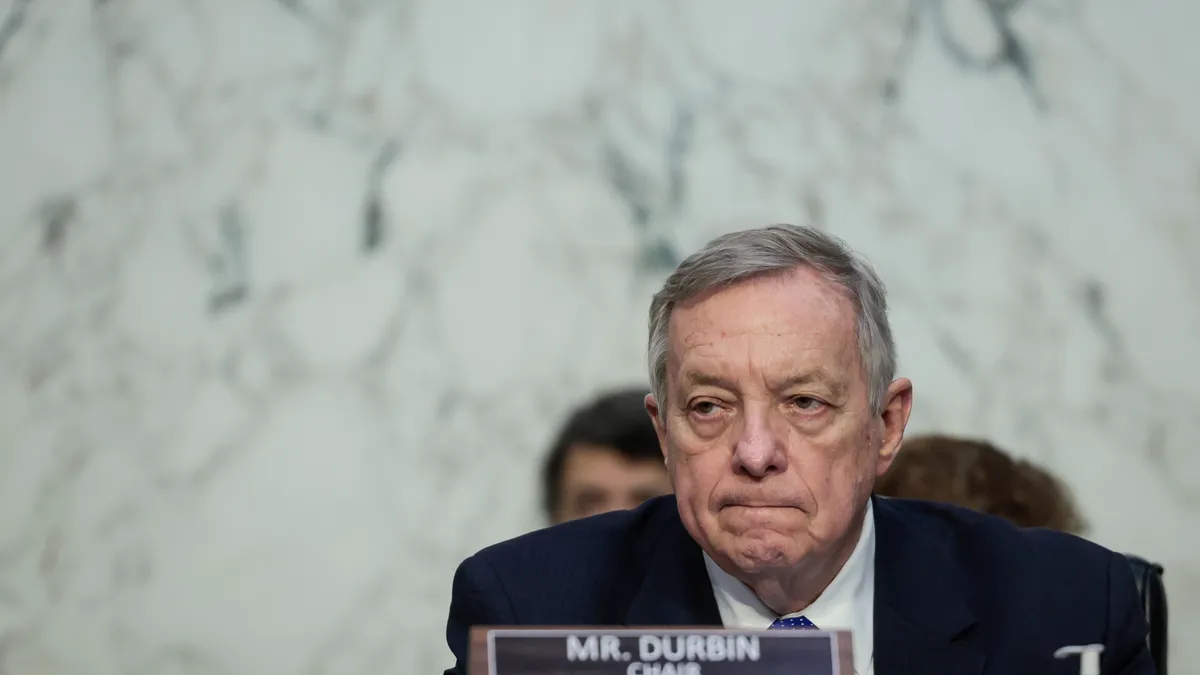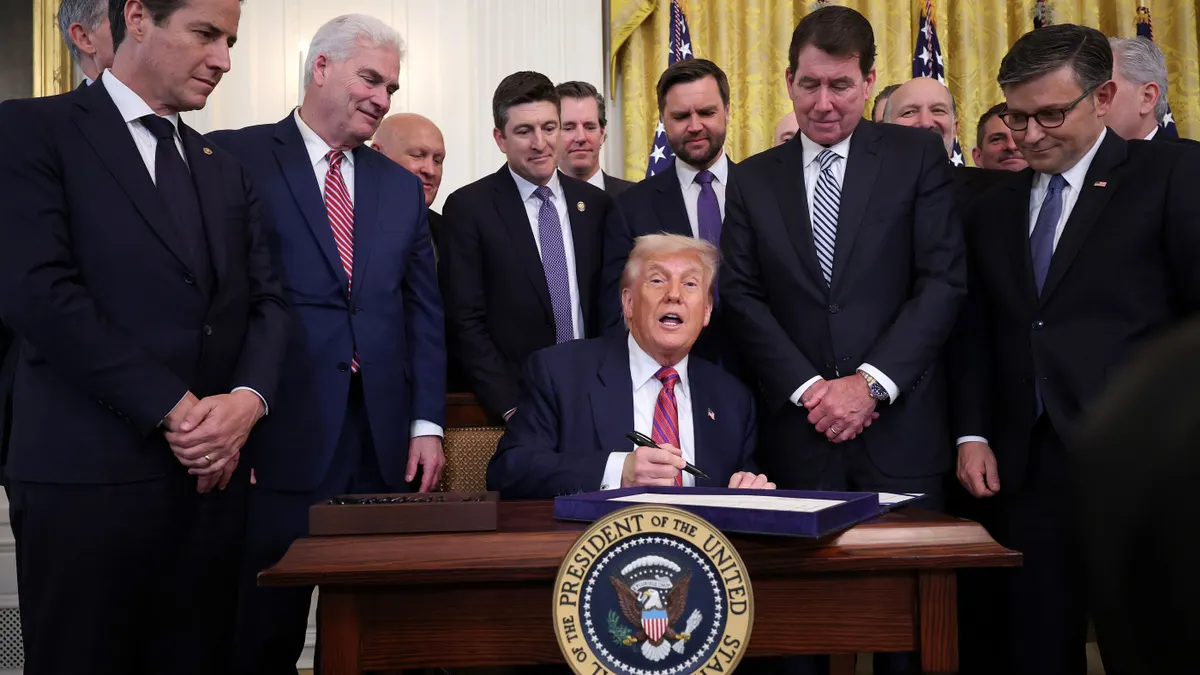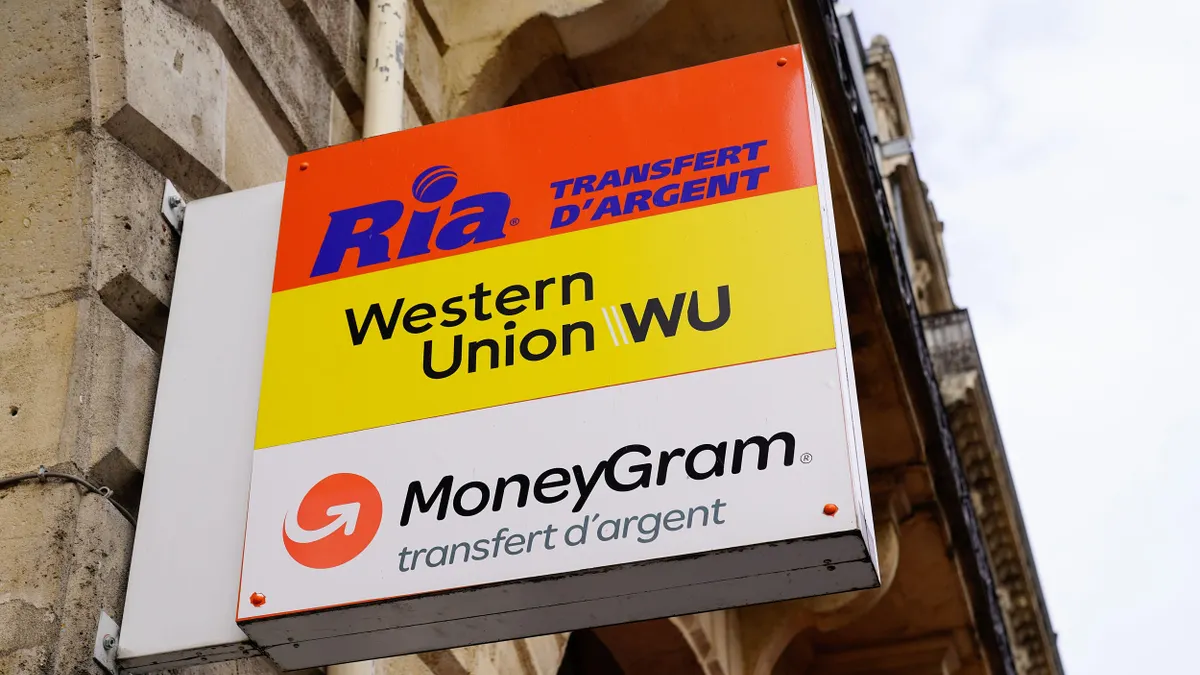Card network companies Visa and Mastercard are likely to get a scolding next week at a recently scheduled Senate Judiciary Committee hearing set to focus on “high swipe fees” and a lack of competition in the industry.
The committee hearing is scheduled for May 4 following the card companies’ moves this month to increase the interchange fees they charge merchants when consumers use their credit and debit cards for transactions. The hearing was scheduled this week.
Those fee hikes boost inflation for consumers, said U.S. Sen. Dick Durbin (D-IL), who is chair of the committee and has been a scourge to the card companies for the past decade, taking them to task for imposing ever-escalating fees. The hearing promises to continue that theme.
“Tens of billions of dollars in these swipe fees are charged each year by the dominant card networks Visa and Mastercard, and the fees are structured in a way so they are not subject to competitive market pressures,” said a press release announcing the hearing.
The committee hasn’t said who will testify at the hearing, but there’s a good chance that representatives from Visa and Mastercard will be on the spot to answer Congress members' questions.
“This hearing will examine interchange fees and other anticompetitive practices in the credit and debit card industries, and how rising interchange fees lead to higher consumer prices for goods and services and add to inflationary pressures,” the announcement for the hearing said.
Durbin, who is also the U.S. Senate majority whip, took the card companies to task earlier this month over their plan to increase the fees, joining with a fellow Democrat and two Republicans to send a letter to the CEOs of Visa and Mastercard imploring them not to increase fees.
“We urge you to withdraw your plan to raise credit and debit card fees on American business owners and hard-working American families,” the letter said. “As Americans are dealing with the highest rate of inflation in decades, your profits are already high enough and any further fee increase is simply taking advantage of vulnerable Americans.”
The card companies essentially shrugged, with a spokesperson for Mastercard noting the No. 2 card company had delayed increases over the past two years during the COVID-19 pandemic and No. 1 Visa not responding to a Payments Dive request for comment.
“The changes that will be made to a select group of credit interchange rates are the first such changes in more than a decade,” Mastercard Spokesperson Seth Eisen said via email at that time, noting there will be both increases as well as decreases.
Visa and Mastercard didn’t immediately respond to requests for comment about the upcoming hearing, which is the first on credit and debit interchange fees since 2006.
The Merchants Payments Coalition, which represents retailers, grocery and convenience stores, gas stations and online merchants, and the National Retail Federation praised Congress for calling the hearing and attacked the card companies for their practices.
“Visa and Mastercard have price-fixed swipe fees for years and have repeatedly moved to block any innovation or fair play that threatens their hold on the payments market," the NRF alleged in a press release Wednesday. “Their fees have more than doubled in the past decade and just last week they pushed through another billion-dollar increase that will make inflation even worse.”
Nonetheless, the Electronic Payments Coalition, which represents credit unions, banks and card network companies, said the congressional hearing was a veiled effort to support big-box retailers, which include companies like Walmart and Target.
“Big-box retailers see the rise in inflation as a great opportunity to try and convince Congress that payment networks are to blame and that additional price caps and other restrictions on credit card interchange fees are needed,” the EPC said in a Thursday statement. “The reality is that this misguided policy would make more money for big retailers and merchants at the expense of everyone else, including consumers, small businesses, community banks, and credit unions.”
Merchant organizations have contended that increased card fees lead them to raise prices for goods and services. That could contribute to inflation already underway thanks to other macroeconomic factors, including Russia’s war in Ukraine and international supply chain constraints.
U.S. merchants paid Visa and Mastercard $77.48 billion in credit card fees and $28.06 billion in debit card fees last year, the Judiciary Committee release said.
“This hearing will help shine a light on how removing barriers to credit and debit card competition and curbing excessive swipe fees would lead to more efficient, more secure, and lower cost electronic payment systems,” the hearing announcement also said.
Durbin has cited the lack of competition in the card industry in the past, calling Visa and Mastercard “a duopoly” and questioning out loud at an antitrust subcommittee hearing last year whether the “policing authority” was sufficient. He also led the effort to pass the Durbin Amendment to the 2010 Dodd-Frank Wall Street Reform and Consumer Protection Act, creating a law that led regulators to cap debit card fees. Credit card fees are not limited by that act.
The Justice Department and The Federal Trade Commission have initiated probes of the card companies’ practices on and off for years, but it may be getting more difficult to make a case, despite their dominance, because of a swarm of new financial technology companies seeking to undercut their hold on the market. Nonetheless, many of the new fintechs are also partnering with the card giants to share a slice of their billions of dollars in profits.




















